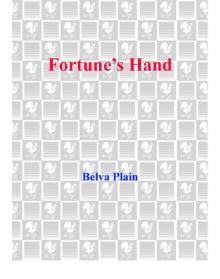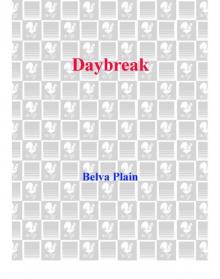- Home
- Belva Plain
The Carousel Page 9
The Carousel Read online
Page 9
Now how to handle this. I don’t want to be on bad terms with Father, and yet I’m not going to break with Roxanne. No way. An apartment, that’s the answer, where we can meet in privacy and comfort. She’ll love it, no matter what she says now. I’ll have it fixed up like a little palace. She’ll love it.
At the thought, Ian began to whistle, and he whistled all the way home.
Chapter Six
June 1990
Coming home after a periodic visit without Tina to Dr. Vanderwater’s office, Sally was comforted. Or, she asked herself, feeling at the same time guilty of being ever so slightly doubtful—ever so slightly—was it a case of needing to be comforted?
“Feel at ease with your child,” the doctor had reiterated. “Your tension can be communicated, so if the child wants to tell you something, it holds her back. For the child to be at ease, you have to be. The household has to be.”
Well, of course. It was elementary. And goodness knew their household was cheerful. It was the home of games and songs, of Dr. Seuss and Winnie-the-Pooh, a veritable kindergarten-at-home. And how Dan did it with everything that was on his mind, all the mess at the office, she did not know.
“Don’t you feel the improvement?” the doctor had asked.
It had been difficult to sit there and deny improvement when actually she was uncertain about it. Last week at a birthday party Tina had been a model guest, quite charming, so that one of the mothers had remarked to Sally upon Tina’s “sunny disposition.” So maybe there really was improvement.
“She’s playing upstairs,” said Nanny when Sally went in. “The yard’s still soaking wet after last night’s rain.”
From the big sitting room, where Dan had a desk and Sally had another at which to conduct her recently neglected business, came the tinkle of a waltz. Upon a table in the center of the room, stood the source of the music: the heirloom, the treasured silver carousel.
“What on earth? What’s that doing here?”
“It’s for me!” cried Tina, exulting. “For me!”
“Honey, it can’t be. This isn’t a child’s toy.”
Indeed, it was not. For a long while Sally had not observed it up close and had forgotten how exquisitely it was made. No two of the horses that rose up and down as they circled were alike. They pranced or they trotted, heads were held high or bent low, and one even seemed to be looking over his shoulder. The tiny couple on the seats, he so neatly suited and she in the bonnet and wide skirt of the Second Empire, could have been worked by Cellini. Only an expert could estimate the value of such a piece.
“Who brought it here?” she asked.
“I don’t know.”
Nanny knew only that the chauffeur from Hawthorne had brought it. There at the main house, the people thought only that Mr. Clive had ordered it to be delivered.
Clive was terse on the telephone. Probably she should not have disturbed him at the office.
“It’s a present from the house, that’s all I know, Sally.”
“Where’s Uncle Oliver?”
“Father left last night for a weekend in Boston.”
“I don’t understand,” said Sally. “What are we supposed to do with it? Tina thinks it’s for her.”
“It’s a present. What’s the fuss? Time we got rid of stuff from the Big House, anyway. The place is cluttered up like a museum. I have to go, Sally. Sorry. I’ve got calls waiting.”
For the rest of the short afternoon, Tina fussed with the carousel, creaking out “The Blue Danube,” and could not be lured away. River so blue, da da, da da—
It was unbearable, and Sally retreated to the bedroom. The light on the answering machine was blinking red as frantically as if it could know the urgency of the message. Sally knew. It would be Dora Heller again. Dora was the editor-in-chief of a major magazine, and this would be her third call in a week with perhaps the most exciting offer Sally had ever received. They were planning an issue to be almost entirely devoted to the life of a great author, a man nearing ninety, who had been born in the Appalachian outback and was known all over the world. Would Sally do a series of photographs for the magazine, Dora wanted to know.
And Sally’s heart had risen. She had thought quickly, a session in New York, rising early and taking the latest possible plane, would involve one night at the most away from home. It could be done, and she would love to.
But no, the author was not prepared to travel. He was to be photographed at home, near Atlanta. And then Sally was to travel, to follow the path of his life, with car and driver provided, naturally, to his mountain birthplace, then to the school near the Florida line where he had briefly taught. In short, they would need a week of her time. And her heart had sunk.
She picked up the phone and dialed the number. Dora’s voice on the other end of the line was almost incoherent.
“Sally! I’ve been waiting for an answer, to tell me that you’ve changed your mind. I can’t believe that I’ve been hearing you right. This is a plum of plums. I fought for you. There were other names, you know that, but I dragged out every sample of your work that I could find and convinced them that you have the style and feeling that we want. You absolutely must say yes, Sally.”
“I can’t, I have some problems here, and I can’t leave. It’s too far and will take too long. I’m sorry.”
“You’re not sick, I hope.”
“No, not sick.” Then she knew that she sounded weak and was being too mysterious. And putting strength into her voice, she added, “Nobody’s sick, we’re not getting a divorce or anything. It’s our little girl who’s having some problems, and so—”
“Not too bad, I hope?”
“Oh no, but I can’t. I really can’t, Dora. Please don’t beg me.”
“I’m sorry, darling. Really sorry. Well, another time.”
River so blue, da da, da da—
“What’s going on?” demanded Dan, coming in with his tie loosened and flung across his shoulder, so that she saw at once that he was in one of his rare bad moods. “What’s that thing doing here?”
“The carousel, you mean?”
“What else can I mean?” When Sally repeated Clive’s remark about clutter, he said, “So they make a dump out of this house.”
“That doesn’t sound like you. I’m sure it was well meant.”
“Well, okay, but the thing’s worth a fortune, and Tina will only break it.”
“I don’t think she will, but I’ll admit that ‘The Blue Danube’ is driving me a little crazy.” And seeing that Dan had flung his jacket on the bed and had sat down with a groan, she said mildly, “She’ll get tired of it, and then we’ll hide it someplace or try politely to return it. It’s not worth getting yourself upset over.”
“That waltz will drive me crazy too. The damn thing’s too loud.” He got up, and opening the door, called, “Tina, turn that thing off, please.”
“No, I like it.”
“Yes, but we don’t. Turn it off,” Dan said firmly.
“No, I said.”
“Tina, you will do what I tell you to do.”
When he strode out across the hall, Sally followed. “Dan, take it easy. You’re awfully tired and troubled. I can see, but—”
“But what? What do you think I’m going to do to her?”
“I only meant she’s had a pretty good day today, and—”
“And that’s a reason why she mustn’t be made to obey a simple command?”
“Of course not. But I do think we’re making progress, and Dr. Vanderwater said today—”
“Dr. Vanderwater doesn’t live here. We do. Maybe we ought to stop following all these books and theories. Maybe we should just use our own heads.”
The child was leaning on her elbows at the table as if the carousel had hypnotized her. Dan strode over and switched off the music. Tina let out a howl, a roar, as if he had struck her, and kicked him sharply on the ankle.
Dan picked her up under the arms and held her.
“Now list
en here, Tina. You are not allowed to kick or hit. You’re five years old, and you understand perfectly—”
She kicked his knee. “Don’t touch me! Put me down. I hate you! Put me down!” And howling still, she ran from the room.
The parents stood and stared at each other. Dan looked stricken.
“Danny, she doesn’t hate you.”
He frowned. “Don’t you think I know that? But did I do wrong? Do we let her get away with murder? She runs this house and runs our lives, don’t you see?”
Oh, she saw it all right. A week’s work away from home should not be an impossibility.
“We tiptoe around her moods, we’re afraid of her. What’s it going to be like when she’s fifteen? Tell me that. I’m going downstairs now and have a little talk. Don’t look so scared. I’m not about to lose my temper with a child.”
“Please. This isn’t the time. Leave her to Nanny. She’ll calm her. Come back to our room and tell me what went wrong today.”
She sat down on the arm of his chair and laid her cheek on top of his head. “What is it? The same thing again?”
“It was a bad day. Ian’s impossible. Can a man get a new personality overnight? The last couple of weeks he’s been a different person. Here’s what happened this afternoon. You remember the coffee drink I told you about that some fellow in Michigan thought up? It should be a bonanza if we can make the right deal with the right Colombian party. So I got an appointment set up, the Colombian flew in, the Michigan man drove—why, I don’t know except maybe he likes to look at scenery.” Dan was breathless. “Anyhow, he was an hour and a half late, which is a bother, but not a calamity. And Ian went wild, bawled him out and generally humiliated him. The fellow’s very young and eager to make the deal, but he was so offended that he walked out. Took his briefcase and walked out! I had to run after him, apologizing. Finally, when I got him to come back in, Ian apologized, and I’m keeping my fingers crossed that we can make the deal. But it used up every ounce of my energy. That’s why I came home early. They’re all still at the office, but I had to get out.”
“What did Clive think of it?”
“He’s at the other end of the hall, and I don’t think he heard it. Anyway, if he did hear it, he would only shrug his shoulders and go back to his numbers, poor guy.”
The telephone rang. “Answer it. I’m not home,” Dan said. “Whoever it is, I’ll call back.”
With her hand over the mouthpiece, Sally whispered, “It’s Ian with Amanda. A three-way call.”
Sighing, Dan took the phone. “Here I am.”
Sitting on the edge of the bed, uncomfortably slumped, he listened. What an awful day, Sally thought, watching him. She was used to seeing him in charge of affairs, reckoning, confident, and cheerful, and it hurt too keenly to see him like this.
“I know, Amanda. I understand your position. You’ve made it clear. We’ve had this discussion before, haven’t we?”
From across the room, Sally heard faintly a voluble female voice. Amanda evidently had a lengthy story to tell.
“I know,” Dan repeated. “I know why you want the money, and I agree it’s for a good cause. The problem is that we don’t have it. Our bankers have been clear about that. We can’t do it without destroying our business.”
There was more talk. Dan’s right leg, crossed over the other one, began to swing, while his left foot tapped the carpet.
“If we sell off the woods, we could give Amanda her share. But I don’t want to sell off the woods, that’s the whole point. And I don’t know how many times you want me to say so, Ian.”
Ian will never be moved, Sally thought with rising indignation. And she recalled his jibes about how Dan “hugged trees.” In his eyes, ever since this proposal had been under discussion, Dan was “sentimental,” not “practical.” How absurd! Running a business as he did, Dan wasn’t practical? Could a practical man not be gentle and have ideals, too?
“Clive and I can’t run this operation by ourselves. It’s far too big. I’ve told you that before, too. And if this firm collapses, have you any idea, leaving ourselves out of the picture, what it will do to the community we live in?”
Pause. “Yes, I’m well aware that you give plenty to charity.” Dan spoke sarcastically. “And I’m not asking you to sacrifice anything you have. I’m asking you not to go grabbing for more when doing so will hurt so many people.”
Pause. “How? Well, I’ll tell you how. I stopped at a gas station yesterday, and the owner, who knows me well, came over to ask about that item in last week’s paper, the rumor about the foreign investors. He was mighty upset, for the same reasons I am. And even our nanny told Sally and me that people in town, relatives of hers, are worried about talk of Grey’s cutting down, cutting jobs. They’re scared, and they’ve every right to be.”
There was a jumble of voices, audible to Sally but indistinguishable, as if Amanda and Ian were both talking at once.
Presently, Dan said, “We are talking calmly. At least, I am.”
Pause. “Yes, I am talking calmly. You say there’s going to be a fight? Seems to me you’re spoiling for one right now. I don’t know what’s come over either of you. I surely don’t want a fight. I wish we could talk to Oliver.… Yes, I heard him say he doesn’t want to be involved, but … All right, then, let’s bring Clive in … Dammit, Ian, can’t we have some order here? Amanda? Speak louder, Amanda. I’m not hearing you.… What? She hung up? Good God, you’re both crazy. Okay, I’m stubborn, but so are you. I don’t know how to deal with you, either, Ian. That performance this afternoon …”
Dan turned away from the telephone. “Ian hung up on me.”
“Can’t Clive do anything? No matter what else Ian may think of him, he respects his intelligence. He’s almost in awe of it.”
“Yes and no. Didn’t you hear me ask about Clive just now? ‘Never made a nickel on his own in his life’ was Ian’s answer. ‘Doesn’t know a thing about business. A math whiz with a computer in his head. And anyway, he’s coughing himself to death.’ So much for Ian.”
“Maybe you should go to Uncle Oliver after all.”
“I can’t force him to take sides when his own son is involved, can I? It wouldn’t be fair to the man. Besides, he’s not young anymore.”
“Poor Dan. Where’s this going to end?”
“Oh, somehow. I’m not going to be beaten, Sally, although I may look it this minute.”
“Happy’s worried about Ian. She’s never said a word to me before about anything that personal, so she surprised me. She said he’s been in a terrible mood for the last few weeks. She doesn’t recognize him.”
“He gets like that sometimes,” Dan said. “Come on, let’s get something to eat. It’s half-past six, and the end of a rotten day, but still I’m hungry.”
Chapter Seven
June 1990
At half-past six Roxanne emptied a bag of takeout chicken on two paper plates and handed one to Michelle. On the rickety table between the two beds stood a six-pack of Coke and a box of donuts.
“There. A whole lot better than eating with that brawling crew downstairs. Pop’s in a foul mood, the kids are fighting, and I’m sick of them all.”
Settled against the headboard of the bed, she was able to see herself in the dresser’s mirror. It was interesting, instructive also, to watch the changes in herself as she talked and gestured, letting her hair fall carelessly in a becoming loop over her cheek or laughing so that her fine teeth showed and dimples formed.
Then, frowning, her glance fell on the faded green rag rug in front of her dresser and roved from Michelle’s cheap cupboard, covered in yellow varnish and missing a handle, to the washed-out curtains at the single window. The cramped little room reminded her of those dingy motels, or looked even worse than they did because it was littered with possessions: Clothes, music tapes, and Michelle’s schoolbooks covered every flat surface.
“This place is a dump,” she said, startling Michelle. “I want to get out of her
e.”
“You could fix it up.”
“I could? With what? Unless you’ve got money stashed away someplace.”
“Well.” The younger girl gave Roxanne a significant, ironic smile. “No, but you can always get money.”
“That’s what you think. You’re wrong.”
“He phoned again, right after I got home from school. I picked it up before anybody else got to it.”
“Thanks. Did he say anything?”
“Just said, ‘Roxanne there?’ I said what you told me to say. ‘She’s not home and I don’t know when she will be.’ ”
“Good. He’s going crazy, and it serves him right.”
“It’s the fourth time he’s called since Sunday.”
“Serves him right, I said.”
“What’s he done to make you so mad?”
“He won’t marry me, that’s what. I don’t like this arrangement. I don’t want to live this way. It’s been too long. I won’t be used anymore. Sure it’s great right now, but—and you listen to me, Michelle, you take it from me—only a damn fool would go on indefinitely with something that can be ended whenever the guy wants to end it. Apartments, cars, the whole works can be cut off in two seconds, and you’re right back where you started, except that you’re older. No, I’m sick of it, and I’m through.”
“Why don’t you threaten to tell his wife?”
“You think he’d thank me for that? You think he’d buy me a ring and move me into his house after a messy divorce? Me? How dumb can you be? It would only wreck the woman and do nothing for me.”
As she flung her arm out, Roxanne’s plate slipped, dropping a greasy chicken leg and a heap of coleslaw onto the bedspread. This accident was the last straw. It broke her control, and she burst into tears.

 The Golden Cup
The Golden Cup Her Father's House
Her Father's House Whispers
Whispers Crescent City
Crescent City Legacy of Silence
Legacy of Silence Crossroads
Crossroads Promises
Promises After the Fire
After the Fire Tapestry
Tapestry Looking Back
Looking Back Heartwood
Heartwood The Carousel
The Carousel Fortune's Hand
Fortune's Hand Homecoming
Homecoming Random Winds
Random Winds Harvest
Harvest Evergreen
Evergreen Treasures
Treasures The Sight of the Stars
The Sight of the Stars Secrecy
Secrecy Daybreak
Daybreak Eden Burning
Eden Burning